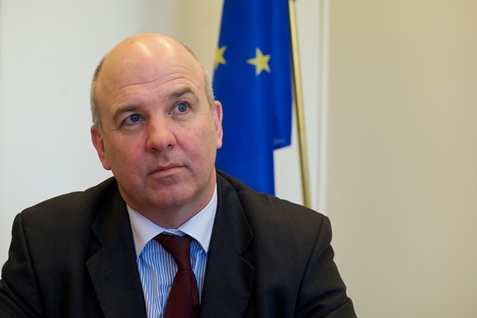On the occasion of the Nelson Mandela International Day, a group of human rights experts with a mandate relating to detention have hailed the adoption of the Nelson Mandela Rules, the revised Standard Minimum Rules for the Treatment of Prisoners, which were adopted on 17 December 2015.
The United Nations Special Rapporteur on Torture, Juan Méndez; the Special Rapporteur on Prisons, Conditions of Detention and Policing in Africa, Med Kaggwa; the Rapporteur on the Rights of Persons Deprived of Liberty of the Inter-American Commission on Human Rights, President James Cavallaro, and the Council of Europe Commissioner for Human Rights, Nils Muižnieks, welcomed the Nelson Mandela Rules as a historic step and one of the most significant human rights achievements in recent years.
Their adoption completed a four-year process of negotiations on the review of the 1955 UN Standard Minimum Rules for the Treatment of Prisoners.
The UN General Assembly decided at their adoption that they should become known as the “Nelson Mandela Rules”, to honor the legacy of the late President of South Africa. They also decided that Nelson Mandela International Day, observed each year on 18 July, should be utilized to promote humane conditions of imprisonment.
“The revised Rules represent a universally accepted minimum standard for the treatment of prisoners, conditions of detention and prison management, and offer essential practical guidance to prison administrations,” they noted. “The implementation of the Rules in prisons around the world would significantly improve the treatment of millions of detainees. At the same time, it is useful guidance to help prison staff deliver their important and difficult task in a professional and effective way, benefiting society at large. Speedy and decisive steps towards implementation would truly honor the legacy of the great Statesman and inspirational leader, Nelson Mandela, who spent 27 years in prison.”
“The revised Rules are premised on the recognition of prisoners’ inherent dignity and value as human beings, and contain essential new procedural standards and safeguards that will go a long way in protecting detainees from torture and other ill-treatment Special Rapporteur on Torture, Juan E. Méndez noted. “The prohibition of the use of prolonged solitary confinement, defined as that in excess of 15 days, is a particularly important new provision in the Rules. Other key advancements are the recognition of independent healthcare professionals who have a duty to refrain from participating in torture or other ill-treatment and have a vital role in detecting such ill-treatment and reporting it. The recognition of the obligation to promptly, impartially and independently investigate all allegations of torture or other ill-treatment by prisoners is also worth highlighting.”
“Inhumane conditions in prisons are one of the main human rights concerns in the world, including in Europe. The revised Rules are a welcome step forward because they are an additional tool available to governments to transform prisons from mere places of punishment into places of rehabilitation” said Nils Muižnieks, Council of Europe Commissioner for Human Rights. “It is crucial that governments abide by these rules, as well as other regional standards, while, at the same time, implementing measures to reduce overcrowding, such as alternatives to imprisonment. This will make it easier to manage prisons in conformity with states’ obligations in regard to prisoners in their care. There must be a life after imprisonment: better conditions of detention can mean higher chances of reintegrating into society.”
Rapporteur on the Rights of Persons Deprived of Liberty of the IACHR, James Cavallaro, also emphasized the importance of legal alternatives to imprisonment and of rehabilitation and social reintegration programs. With regard to the Nelson Mandela Rules, he stated, “These Rules represent a vital advance in the protection of vulnerable groups, in particular, persons with disabilities deprived of liberty. In this regard, among other provisions, the Rules require prison authorities to make reasonable accommodations to ensure that prisoners with disabilities have full and effective access to detention conditions and resources on an equitable basis”. In general, the provisions regarding reasonable accommodations are more detailed than the standards currently established by the Inter-American Human Rights System.
The Special Rapporteur on Prisons, Conditions of Detention and Policing in Africa, Med Kaggwa, also hailed the adoption of the Nelson Mandela Rules and pointed to the recent resolution of the African Commission. It establishes a Follow-up Committee to develop strategies for the promotion and implementation of the Rules. “I am confident that the Nelson Mandela Rules provide an inspiration to prison authorities across the globe to revise and update their systems. The revision is also crucial to monitoring bodies like my Rapporteurship to assess prison conditions against an up-to-date set of standards. The inherent dignity of prisoners and value as human beings has been mainstreamed throughout the revised Rules, which is what Nelson Mandela was all about.”
The four human rights experts lauded the inclusiveness of the revision process, featuring participation of representatives from intergovernmental organizations, civil society and academia. The constructive spirit of cooperation displayed by Member States in adopting the Rules must now be followed by their effective implementation in domestic legislation and practice, the experts stated.
They welcomed the efforts of civil society in the promotion of the Nelson Mandela Rules, in compiling guidance on the application of the Rules and in supporting states to start a process of implementation.
Media contacts:
• For the UN Special Rapporteur on Torture, please contact: Andrea Furger (+41 22 928 93 98 / afurger@ohchr.org) or Andra Nicolescu (+1 202 997 5190 anicoles@wcl.american.edu or write to sr-torture@ohchr.org.
• For the Special Rapporteur on Prisons, Conditions of Detention and Policing in Africa, please contact: Med Kaggwa (mkkaggwa@uhrc.ug / mskkaggwa@yahoo.com)
• For the Rapporteur on the Rights of Persons Deprived of Liberty of the Inter-American Commission on Human Rights, please contact: María Isabel Rivero (+1 202 370 9001 / mrivero@oas.org)
• For the Council of Europe Commissioner for Human Rights, please contact Ms Danara Dourdoussova (+33 (0)3 90 21 42 53 / Danara.DOURDOUSSOVA@coe.int)



